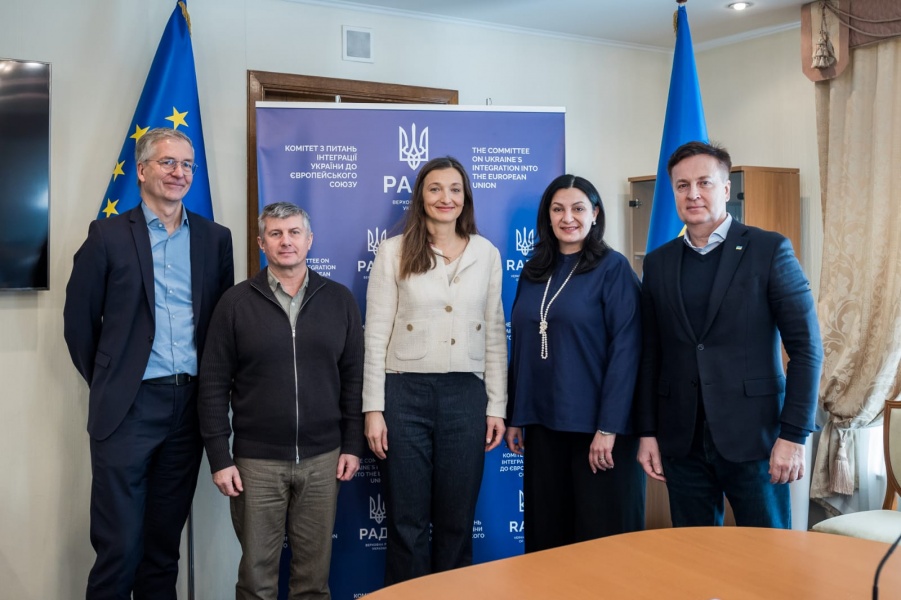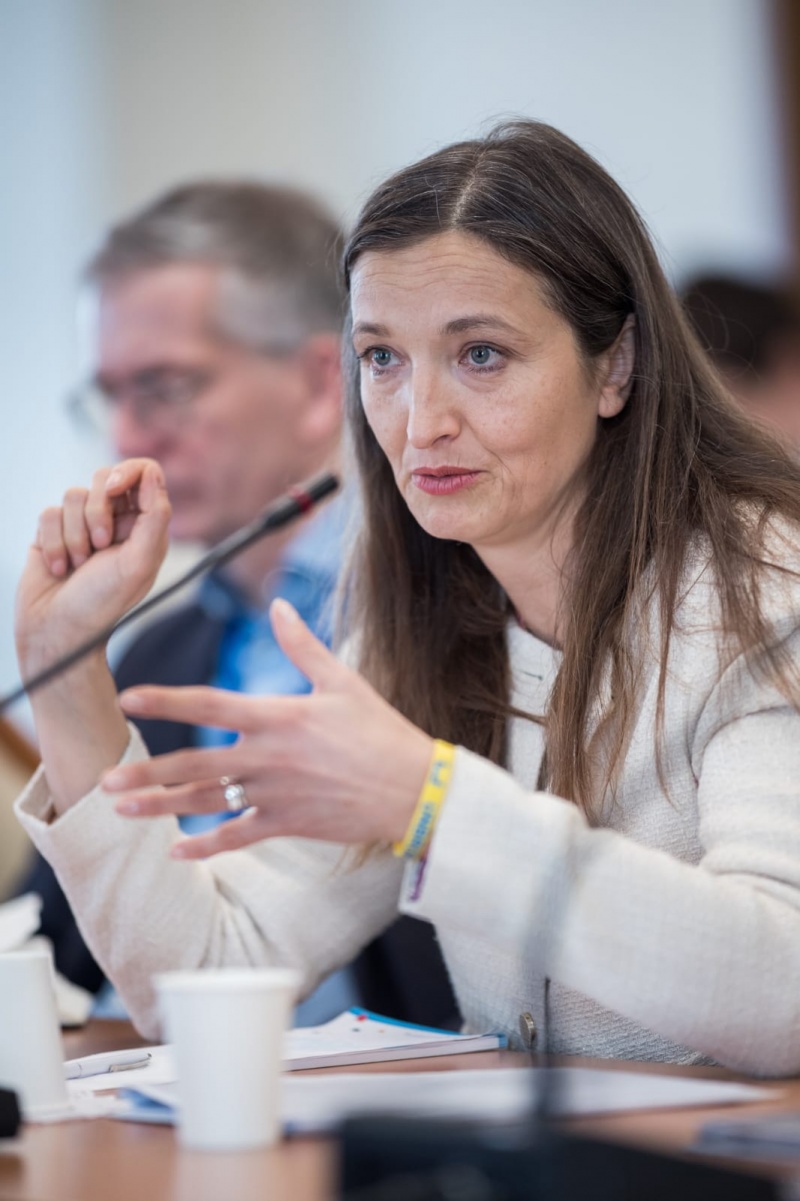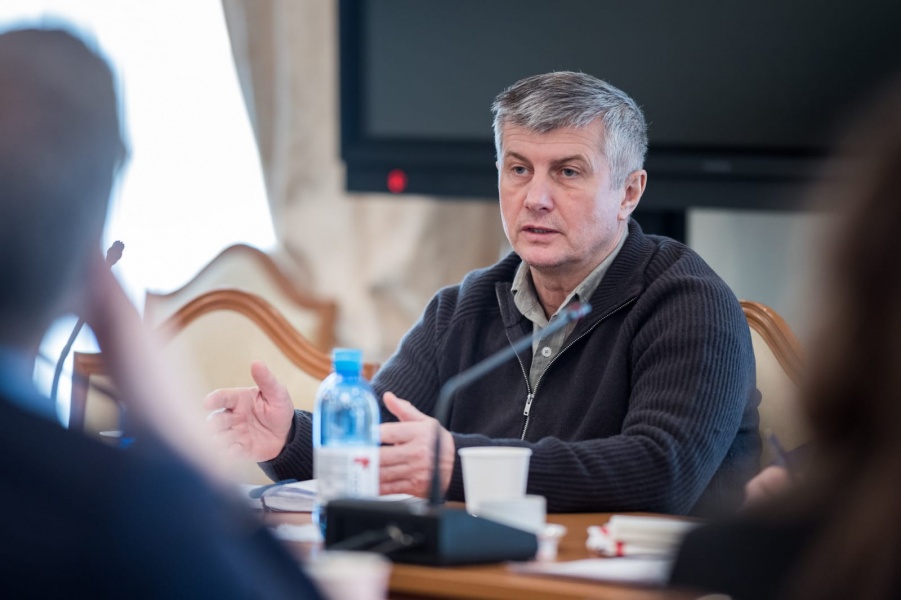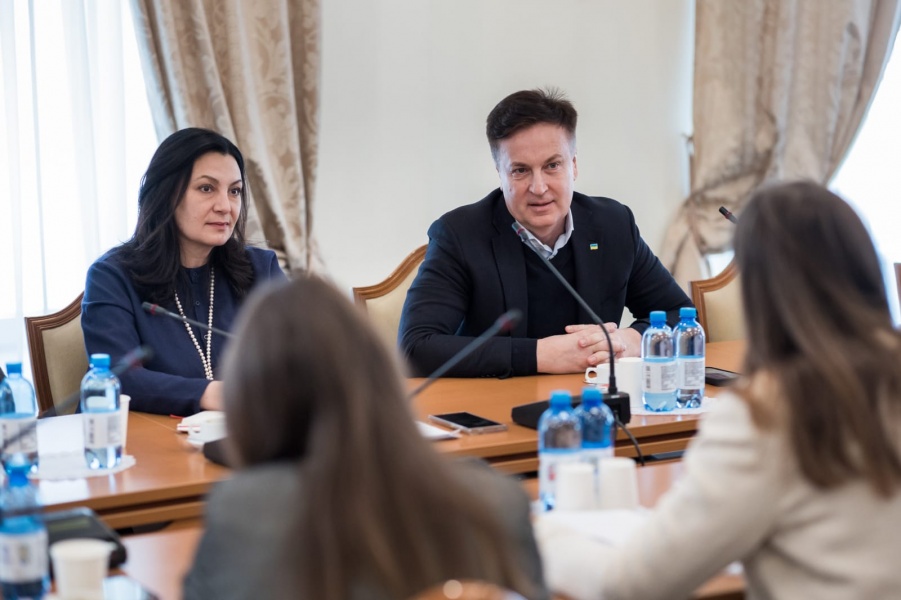The Committee on Ukraine's Integration into the EU held a meeting with the Head of the Reconstruction and Accession Unit of the European Commission Directorate
11 February 2025, 11:40

Members of the Committee on Ukraine's Integration into the EU met with the Head of the Reconstruction and Accession Department of the Directorate General for Enlargement and Eastern Neighbourhood, Ukraine Service, Elena Vishnar Malinovska.
Elena Vishnar Malinovska stressed that before opening negotiations in various clusters, it is important to ensure effective bilateral interaction between Ukraine and the EU Member States, since many decisions require unanimous approval. According to her, Ukraine will soon receive an invitation to present benchmarks for the rule of law and public administration reform, as well as an action plan on national minorities and a roadmap for the functioning of democratic institutions. It is important to create a constructive space for these documents to be presented. She also stressed the importance of sustained cross-party support in Ukraine for the implementation of the reforms.
The Chair of the Committee on Ukraine’s Integration into the EU, Ivanna Klympush-Tsintsadze, thanked Elena Vishnar Malinovska for her visit to Ukraine. “It is very important that we support this dialogue, that we reflect on how to respond to the challenges and seek solutions. It is important for us that our dynamics align with the dynamics of the European Commission,” said Ivanna Klympush-Tsintsadze. She raised the issue of the role of the Parliament in the process of European integration. According to her, Ukraine decided in a rather specific way to involve the Parliament in the fulfilment of tasks on the path of European integration, inviting deputies to working groups. “In my opinion, the supervisory and control function of the legislative body in this process is being overlooked. However, at the level of the committee, we will try to preserve this function. In cooperation with other committees, we are also trying to coordinate the interaction process at the level of the Parliament,” said the Committee Chair. She is convinced that the Verkhovna Rada, at least informally, should agree on the roadmaps that will be presented by the Government to the European side. “The Parliament and various political forces should be informed about the provisions included in the roadmaps. This requires the systematic involvement of all parties. I hope that the Government and the executive branch will be ready to better involve all political forces in this process at the systemic and institutional level,” said Ivanna Klympush-Tsintsadze.

Regarding the budget deficit and urgent needs of Ukraine, Ivanna Klympush-Tsintsadze thanked the EU for all the assistance provided. “We are very grateful for what the European Union has done for Ukraine. We are also grateful for the creation of a financial support mechanism, but I think that greater efforts should be made to ensure that frozen Russian assets in the EU are used for the benefit of Ukraine,” the Committee Chair emphasised. She also called on the European Union to consider the possibility of taking on assistance programs for Ukraine that have been suspended by the United States. “We do not know whether these programs will be resumed. We will, of course, work with the American side and hope that most of the programs will still be resumed after their assessment. But we need to cooperate with the EU to find out whether assistance can also be provided to Ukraine in this matter,” said Ivanna Klympush-Tsintsadze.
She also highlighted the need to establish a separate support mechanism for Ukraine while working on the future EU budget because, unlike other candidate countries, Ukraine’s integration into the European Union is taking place under unprecedented conditions. The war creates many additional challenges. Regarding the need for high-quality bilateral cooperation with EU members, Ivanna Klympush-Tsintsadze stressed that Ukraine is ready for such cooperation, however, some member states prioritise their internal agenda over the EU common interests and sometimes even promote hostile Russian narratives. In such cases, it is extremely difficult to find a common language with such states. According to the Chair of the Committee, not only bilateral cooperation, but also the work of the European Commission and the European Parliament with such countries is needed.

First Deputy Chair of the Committee on Ukraine's Integration into the EU Vadym Halaichuk noted that Ukraine faces many challenges and has multiple obligations on its path to the EU, and the role of the Parliament in this process is crucial. He noted that discussions are ongoing on the reform of the parliamentary procedures to respond to the challenges. For example, changes to the rules and procedures needed for faster and smoother implementation and transposition of European directives into Ukrainian legislation are being discussed. According to Vadym Halaichuk, it is important not only to speed up this process but also to guarantee compliance with the law, in particular, the constitutional right of each deputy to amend legislative acts. Regarding political unity, the First Deputy Chair of the Committee noted that inter-party support for Ukraine's European integration, which had been strong for more than two years, has become more complicated due to various reasons. He hopes that the dialogue will continue and that the parties will conduct an honest and open discussion, in particular, regarding the legislation to be implemented within the framework of the Ukraine Plan and other European integration obligations. “A dialogue is very important. And the reason why deputies were included in the working groups is to make this process faster and more effective,” said Vadym Halaichuk. He also emphasised the need to consider the possibility of EU support for important projects that are no longer covered by the United States. Regarding European integration, Vadym Halaichuk noted that there is an ambitious hope to open negotiations on all clusters that were planned to be covered this year.

The Secretary of the Committee, Valentyn Nalyvaichenko, thanked the EU for its support and progress in establishing the Special Tribunal for the crime of aggression against Ukraine. He also stressed that Ukraine is working hard to move towards both the European Union and NATO membership. Valentyn Nalyvaichenko mentioned security priorities of the Polish Presidency in the EU Council. He stressed that Ukraine has vast experience in the field of defence and security, in particular cybersecurity, and this experience can be useful to the European Union.
Elena Vishnar Malinovska stressed that before opening negotiations in various clusters, it is important to ensure effective bilateral interaction between Ukraine and the EU Member States, since many decisions require unanimous approval. According to her, Ukraine will soon receive an invitation to present benchmarks for the rule of law and public administration reform, as well as an action plan on national minorities and a roadmap for the functioning of democratic institutions. It is important to create a constructive space for these documents to be presented. She also stressed the importance of sustained cross-party support in Ukraine for the implementation of the reforms.
The Chair of the Committee on Ukraine’s Integration into the EU, Ivanna Klympush-Tsintsadze, thanked Elena Vishnar Malinovska for her visit to Ukraine. “It is very important that we support this dialogue, that we reflect on how to respond to the challenges and seek solutions. It is important for us that our dynamics align with the dynamics of the European Commission,” said Ivanna Klympush-Tsintsadze. She raised the issue of the role of the Parliament in the process of European integration. According to her, Ukraine decided in a rather specific way to involve the Parliament in the fulfilment of tasks on the path of European integration, inviting deputies to working groups. “In my opinion, the supervisory and control function of the legislative body in this process is being overlooked. However, at the level of the committee, we will try to preserve this function. In cooperation with other committees, we are also trying to coordinate the interaction process at the level of the Parliament,” said the Committee Chair. She is convinced that the Verkhovna Rada, at least informally, should agree on the roadmaps that will be presented by the Government to the European side. “The Parliament and various political forces should be informed about the provisions included in the roadmaps. This requires the systematic involvement of all parties. I hope that the Government and the executive branch will be ready to better involve all political forces in this process at the systemic and institutional level,” said Ivanna Klympush-Tsintsadze.

Regarding the budget deficit and urgent needs of Ukraine, Ivanna Klympush-Tsintsadze thanked the EU for all the assistance provided. “We are very grateful for what the European Union has done for Ukraine. We are also grateful for the creation of a financial support mechanism, but I think that greater efforts should be made to ensure that frozen Russian assets in the EU are used for the benefit of Ukraine,” the Committee Chair emphasised. She also called on the European Union to consider the possibility of taking on assistance programs for Ukraine that have been suspended by the United States. “We do not know whether these programs will be resumed. We will, of course, work with the American side and hope that most of the programs will still be resumed after their assessment. But we need to cooperate with the EU to find out whether assistance can also be provided to Ukraine in this matter,” said Ivanna Klympush-Tsintsadze.
She also highlighted the need to establish a separate support mechanism for Ukraine while working on the future EU budget because, unlike other candidate countries, Ukraine’s integration into the European Union is taking place under unprecedented conditions. The war creates many additional challenges. Regarding the need for high-quality bilateral cooperation with EU members, Ivanna Klympush-Tsintsadze stressed that Ukraine is ready for such cooperation, however, some member states prioritise their internal agenda over the EU common interests and sometimes even promote hostile Russian narratives. In such cases, it is extremely difficult to find a common language with such states. According to the Chair of the Committee, not only bilateral cooperation, but also the work of the European Commission and the European Parliament with such countries is needed.

First Deputy Chair of the Committee on Ukraine's Integration into the EU Vadym Halaichuk noted that Ukraine faces many challenges and has multiple obligations on its path to the EU, and the role of the Parliament in this process is crucial. He noted that discussions are ongoing on the reform of the parliamentary procedures to respond to the challenges. For example, changes to the rules and procedures needed for faster and smoother implementation and transposition of European directives into Ukrainian legislation are being discussed. According to Vadym Halaichuk, it is important not only to speed up this process but also to guarantee compliance with the law, in particular, the constitutional right of each deputy to amend legislative acts. Regarding political unity, the First Deputy Chair of the Committee noted that inter-party support for Ukraine's European integration, which had been strong for more than two years, has become more complicated due to various reasons. He hopes that the dialogue will continue and that the parties will conduct an honest and open discussion, in particular, regarding the legislation to be implemented within the framework of the Ukraine Plan and other European integration obligations. “A dialogue is very important. And the reason why deputies were included in the working groups is to make this process faster and more effective,” said Vadym Halaichuk. He also emphasised the need to consider the possibility of EU support for important projects that are no longer covered by the United States. Regarding European integration, Vadym Halaichuk noted that there is an ambitious hope to open negotiations on all clusters that were planned to be covered this year.

The Secretary of the Committee, Valentyn Nalyvaichenko, thanked the EU for its support and progress in establishing the Special Tribunal for the crime of aggression against Ukraine. He also stressed that Ukraine is working hard to move towards both the European Union and NATO membership. Valentyn Nalyvaichenko mentioned security priorities of the Polish Presidency in the EU Council. He stressed that Ukraine has vast experience in the field of defence and security, in particular cybersecurity, and this experience can be useful to the European Union.